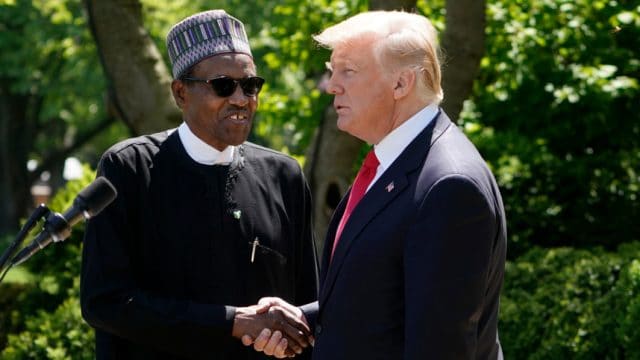Nigerian Government Accused Of Killing Christians By US: Why Does It Still Continue?

Nigerian President Muhammadu Buhari recently revealed that when he met the U.S. President Donald Trump in Washington on April 30, 2018, Trump unequivocally accused him of killing Christians in Nigeria.
Buhari who is Fulani Muslim — regarded as the world’s largest nomadic group; they were early adopters of Islam, participating in Islamic holy wars (jihads) in the 16th century — decided to be honest about what transpired between him and Trump.
“I was in his office, only myself and himself. Only God is my witness. He looked at me in the face. He said: ‘Why are you killing Christians?’”
Buhari responded: “I tried and explained to him this has got nothing to do with ethnicity or religion. It is a cultural thing which the respective leadership was failing the nation.”
The truth of the matter is that while Christian persecution in Nigeria, which can be traced back to the Sokoto Caliphate (1804-1903), has only surged since 2015 when Muhammadu Buhari was elected president because the wiping out of Christians is part of his plan for the country.
It is true that Buhari has in the past expressed dismay about the persecution of Christians by Boko Haram and Fulani jihadists. Yet his government has tacitly targeted those who profess the Christian faith.
According to Emmanuel Ogebe, a leading human rights lawyer in Nigeria,
“Buhari, who is himself from the jihadists’ Fulani tribe, has filled his security council with his kinsmen. He infamously refused to visit Benue State after the New Year’s Day Massacre [2018] that claimed over seventy lives then commanded the state governor to go and “accommodate” the Fulani Herdsmen who had killed his people. The minister of defense has justified the killings and General Buhari’s Government condones and sometimes outrightly supports the Herdsmen. Worse still, General Buhari is a life patron of one of the Herdsmen associations that has claimed some of the attacks.”
Apparently, it cannot be denied that Buhari has always had Islamist agenda. In 2001 at an Islamic seminar in Kaduna, then-General Buhari stated:
“I will continue to show openly and inside me the total commitment to the Sharia movement that is sweeping all over Nigeria. Allah willing, we will not stop the agitation for the total implementation of the Sharia in the country.”
During a White House joint-press conference President Trump held with President Buhari in April, Buhari did not address nor did he outright reject that his government was persecuting Christians in the ongoing attacks linked to his own Fulani herdsmen.
Trump, notwithstanding publicly condemning the persecutions against Christians in Nigeria — “We have had very serious problems with Christians who are being murdered in Nigeria, we are going to be working on that problem very, very hard because we cannot allow that to happen” — did not pursue that matter wit Buhari any further.
Instead, Trump secured a nearly $600 million sales of military planes and security equipment, initially “stalled under the Obama administration because of allegations that Nigeria’s military has been involved in human rights [violations] including rape and extrajudicial killings” — probably the only time President Barak Obama acted against jihadists.
Trump vowed that such assistance is to combat terrorists in Nigeria. But just as with Nigeria’s $320 million purchase of Russian fighter jets in 2017 and other military aid Nigeria has received from China, Buhari’s focus has been to protect his oil facilities from rebel attacks and abductions of foreign oil workers — incidentally, while the U.S. has a travel advisory urging its citizens to avoid some regions in Nigeria “due to crime, terrorism, civil unrest, kidnapping, and maritime crime,” Trump has yet to name Nigeria a terrorist nation, as it has with North Korea, Iran, Sudan and Syria.
On August 22, Crux, a U.S.-based Catholic news outlet, declared that Nigeria is becoming the “biggest killing ground of Christians in the world” due to attacks by Boko Haram and Fulani militants, according to reports by International Christian Concern. The charity estimates that between 50,000 and 70,000 Christians have been killed by radical Islamists in the West African country over the last decade.
Despite the U.S. issuing a travel advisory urging its citizens to avoid some regions in Nigeria “due to crime, terrorism, civil unrest, kidnapping, and maritime crime,” Trump has
Fulani Islamists, however, statistically now pose a greater threat than the Islamic terror group Boko Haram. Meanwhile, as jihadists continue to exterminate Nigerian Christians on a more or less daily basis, both Church leaders and Western politicians continue to prioritize political correctness, the petrodollar and the commerce of arms in the face of Christian persecutions. This only aids and abets the Fulani Islamists, Boko Haram and other Islamic fundamentalists to continue targeting Christians.
__________________________________________________

Mario Alexis Portella is a priest of the Cathedral of Santa Maria del Fiore and Chancellor of the Archdiocese of Florence, Italy. He has a doctorate in canon law and civil law from the Pontifical Lateran University in Rome; he also holds a M. A. in Medieval History from Fordham University, as well as a B.A. in Government & Politics from St. John’s University. He is also author of Islam: Religion of Peace? – The Violation of Natural Rights and Western Cover-Up.
Book available on Amazon, Barnes & Noble or WestBow Press.






Recent Comments